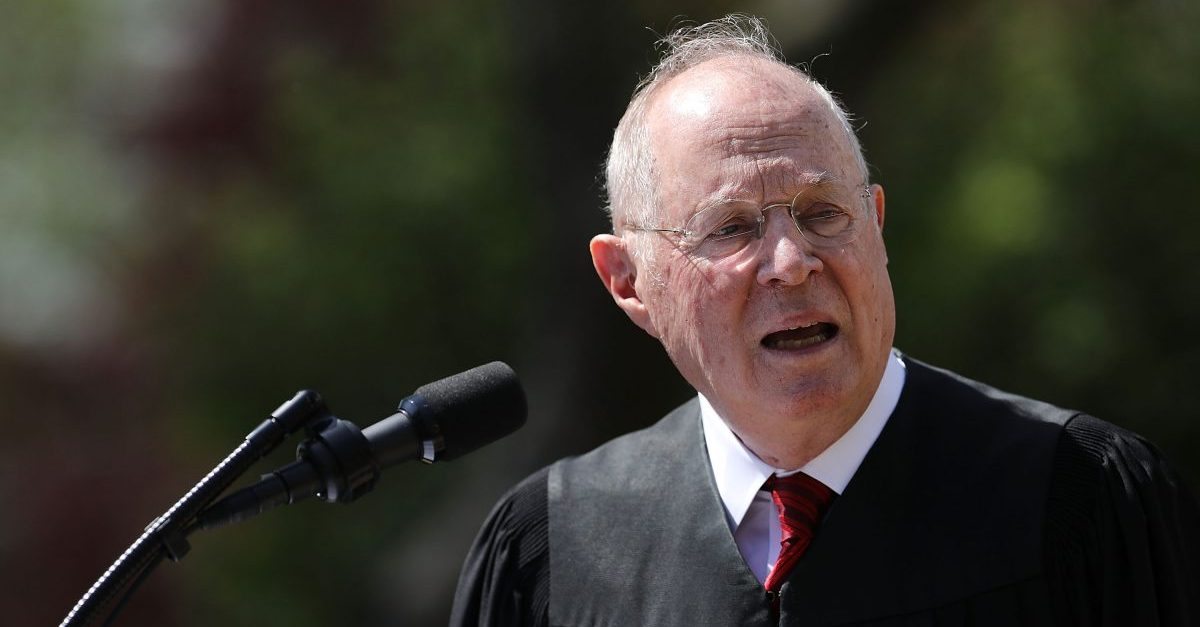
Supreme Court Justice Clarence Thomas has, over the last two days, wasted no opportunity to weigh in on landmark cases he believes were wrongly decided.
On Wednesday, Thomas tore into a landmark case, and former colleague Anthony Kennedy by extension. The case? Obergefell v. Hodges. Then–Supreme Court Justice Kennedy delivered that opinion for the court, siding with Justices Ruth Bader Ginsburg, Stephen Breyer, Sonya Sotomayor, and Elena Kagan in a 5-4 decision holding that same-sex couples’ right to marry is a fundamental right guaranteed by the Fourteenth Amendment.
Thomas, in an opinion on the civil asset forfeiture/excessive fines case Timbs v. Indiana, concurred with his fellow justices in the judgment, but not the road taken to get to it on Wednesday.
“I agree with the Court that the Fourteenth Amendment makes the Eighth Amendment’s prohibition on excessive fines fully applicable to the States. But I cannot agree with the route the Court takes to reach this conclusion,” he wrote.
Thomas then launched into a historical overview on fines, even referencing the Stuart dynasty, the Glorious Revolution, and how “other examples of excessive fines from the historical record informed the Nation’s consideration of the Fourteenth Amendment.”
All of this was to say a) that the “right against excessive fines traces its lineage back in English law nearly a millennium, and from the founding of our country” and b) that the “present case illustrates the incongruity of the Court’s due process approach to incorporating fundamental rights against the States.”
It did not take Thomas long to find two examples of the “incongruity” he sees, and both of them happen to be decisions Anthony Kennedy proved to be a face of: Obergefell and Planned Parenthood v. Casey.
Casey held that “matters,” such as abortion, “involving the most intimate and personal choices a person may make in a lifetime, choices central to personal dignity and autonomy, are central to the liberty protected by the Fourteenth Amendment.” Thomas cited Obergefell, which included as fundamental rights “rights that allow persons, within a lawful realm, to define and express their identity.” Thomas that the “fundamental” rights have at this point been interpreted “so broadly as to border on meaningless.”
The Court ordinarily says, as it does today, that the Clause protects rights that are “fundamental.” Sometimes that means rights that are “‘deeply rooted in this Nation’s history and tradition.’” [some citations removed]. Other times, when that formulation proves too restrictive, the Court defines the universe of ‘fundamental’ rights so broadly as to border on meaningless. See, e.g., Obergefell v. Hodges, 576 U. S. ___, ___–___ (2015) (slip op., at 1–2) (“rights that allow persons, within a lawful realm, to define and express their identity”); Planned Parenthood of Southeastern Pa. v. Casey, 505 U. S. 833, 851 (1992) (“At the heart of liberty is the right to define one’s own concept of existence, of meaning, of the universe, and of the mystery of human life”).
This comes after Thomas’ suggestion on Tuesday that SCOTUS should, when the appropriate times comes, consider reevaluating its jurisprudence on defamation law — namely, whether there should be an “actual malice” standard as decided in the landmark case New York Times v. Sullivan in 1964. Law&Crime explained what that was all about here.
[Image via Chip Somodevilla/Getty Images]